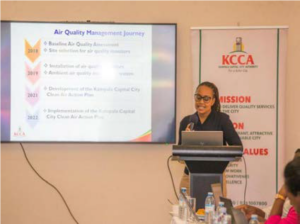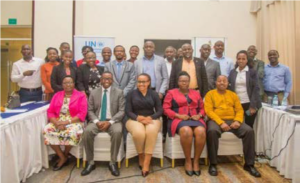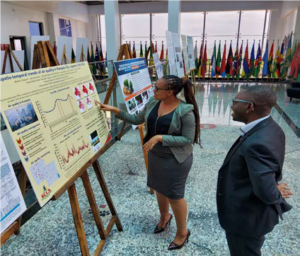 |
|
|||
ABOUT THE FELLOWMackline Ninsiima is an experienced epidemiologist and air quality scientist, holding a Bachelor of Nursing Science (BScN) and Master of Health Services Research (MHSR). During the fellowship, she was hosted at Kampala Capital City Authority (KCCA) where she played a significant role in the operational aspects of air quality management, an opportunity that has been a game-changer for her career. She represented KCCA on various international platforms, including the launch of Clean Air Africa Network, East African air quality stakeholder workshop, air quality and health symposiums in Kenya, CAMS-Net and AfriqAir conference in Rwanda, and Air Sensors International Community (AISC) conference in Ghana. She has demonstrated exceptional capabilities in emergency response, notably during the Sudan ebolavirus outbreak in Kampala City. Due to this outstanding performance, she was nominated among the key stakeholders engaged in drafting guidelines for responding to Ebola/ Marburg Virus disease outbreaks in Uganda. Additionally, she served as a secretariat member for various public health initiatives, including the COVID-19 Intra-Action Review, Ebola After-Action Review, Emergency Preparedness and Response flagship initiative’s scoping mission, and Uganda Joint External Evaluation. She participated in the 2023 Joint External Evaluation in Zambia, demonstrating my commitment to evaluating and enhancing public health responses at both local and international levels. Mackline’s expertise spans a diverse range of areas, including field epidemiology, Incident Management System, Integrated Disease Surveillance and Response, rapid risk assessments of public health events, Joint External Evaluation, After-Action Reviews, scientific writing, and air quality management. This diversity showcases a well-rounded professional dedicated to advancing public health and addressing emerging challenges. Achievements at the Host Site
Fellowship program specific achievements
Summary of Epidemiological Study:Title: Spatio–temporal trends of air quality, Kampala City, Uganda, 2020–2022 Background: Fine particulate matter (PM2.5) is among the health damaging air pollutants; levels exceeding 15 μg/m3 are associated with adverse health effects. We assessed spatio– temporal trends of air quality based on PM2.5 concentration in Kampala City during January 2020–June 2022. Methods: We abstracted PM2.5 concentrations generated by twenty–four Clarity© Node Solar–Powered monitors from January 1, 2020, to June 30, 2022, from the Clarity© dashboard. We computed 24-hour average PM2.5 concentrations by combining data from all monitors. Average PM2.5 concentrations per hour were compared by hour of the day. Seasonal Mann–Kendall statistical test was applied to assess significance of observed trends. Results: Overall, the 24-hour average PM2.5 concentration from January 1, 2020, to June 30, 2022, was 59 μg/m3 (range: 18–182 μg/ m3). A statistically significant decline in PM2.5 occurred throughout the assessment period from January 2020 to June 2022 (r = –0.27, p < 0.001). PM2.5 increased from April to June each year [2020 (55 μg/m3, r=0.56, p=0.006), 2021 (45 μg/m3, r=0.26, p=0.030), and 2022 (37 μg/m3, r=0.37, p=0.030)] and declined from July to September in 2021 (57 μg/m3, r=–0.43, p=0.008) and January to March in 2022 (60 μg/m3, r=–0.41, p=0.011). PM2.5 concentration peaked from 10am–midday (74–73 μg/m3) and 8pm–9pm (73–77 μg/m3). Conclusion: PM2.5 concentrations in Kampala City exceeded the WHO targeted safe levels even during times of less vehicle traffic and economic activity. Studies are needed to identify sources of pollution in Kampala City to develop interventions to improve air quality. Keywords: Particulate Matter, Fine Particulate Matter (PM2.5), Air Pollutants, Cities, Uganda Key lessons learnt during the fellowship
Next StepsPresently, I am seeking an opportunity to pursue a Doctor of Philosophy (PhD) in Public Health, with a specific focus on evaluating the health implications of air pollution, particularly within the Ugandan context. Leveraging on the expertise attained in field epidemiology, I am committed to strengthening public health systems and ensuring implementation of effective emergency preparedness and response strategies to public health emergencies.. Pictorial
|
||||
Sign in
Sign in
Recover your password.
A password will be e-mailed to you.



